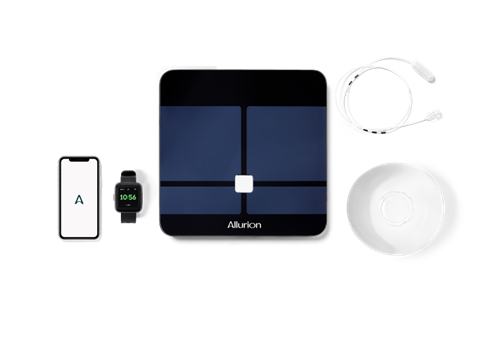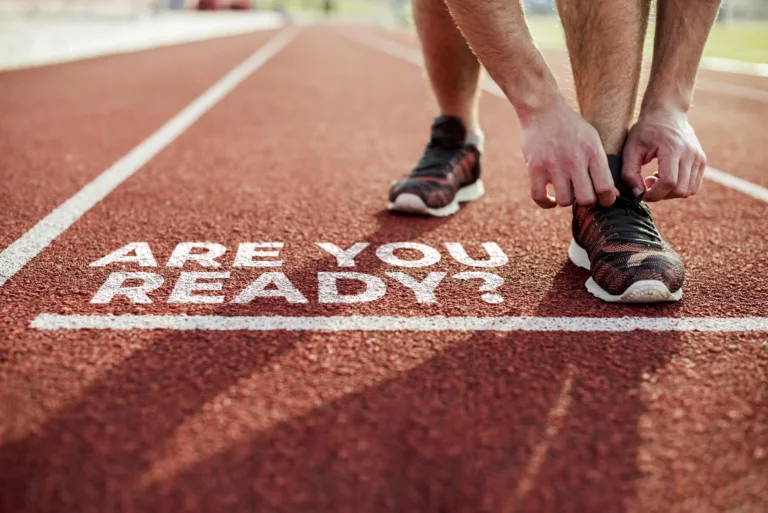Why is tracking your sleep helpful?
Tracking your sleep can help you to become more aware of your sleep patterns. It can help you answer questions like: Am I getting the recommended 7-9 hours of sleep a night? Am I going to bed and waking up around the same time every day? How do I feel in the mornings? Are there certain nights of the week I don’t sleep well? Why is that?
By looking at these patterns, you can learn to work out what’s working and what’s not when it comes to sleep. That in turn can help you to work out what you could change – and to set goals to get there. When tracking your sleep, don’t worry about being perfect and inputting the exact time that you woke up or fell asleep. In fact, you shouldn’t watch the clock at night at all, since ‘clock watching’ can interfere with getting a good night’s sleep. Research has found that tracking consistently is more helpful than exact accuracy.
Your Allurion Health Tracker can monitor your sleep for you.
Does alcohol affect sleep?
While it may seem that having a few drinks before bed helps you fall asleep faster and sleep better, the opposite is actually true. Studies have consistently found that drinking alcohol – even small amounts – near bedtime makes it harder to fall asleep. It can also result in you waking up more often, plus it can stop you getting a deep sleep. However, as with most things, alcohol affects people differently. How your sleep is affected may depend on the amount you drink and when you drink it, as well as on your tolerance levels and your typical alcohol habits.
Does caffeine affect sleep?
Drinking caffeine close to bedtime can disrupt your sleep, but it differs from person to person. Individual responses to caffeine vary and its impact on your sleep can depend on factors like how much caffeine you drink during the day and your tolerance levels.
If you’re used to drinking a lot of caffeine, a small amount before bed may not affect your sleep. However, if you’re more sensitive to it, it could result in a disrupted sleep.14 It may take some trial and error to work out how much caffeine you can drink – and when – without it affecting your sleep. Instead of a caffeinated coffee or tea at bedtime, try herbal teas like chamomile or lavender to help relax you.
Does nicotine affect sleep?
Nicotine is a stimulant that promotes wakefulness – it can impair your sleep, especially in high doses. Studies have found that using nicotine can make it harder to fall asleep, leading to less sleep. It can also lead to you waking up more often during the night. Unlike caffeine, which may not affect your sleep as much if you’re a regular caffeine user, nicotine can impact sleep even if you have a high tolerance for it. That’s why it’s recommended to avoid nicotine – including smoking, pills and patches – to get better sleep. It’s worth noting, too, that if you’ve recently stopped using nicotine, you may find that your sleep is disrupted as you go through withdrawal.
Does exercise before bedtime affect sleep?
The science is clear that staying active helps your sleep quality. Regular physical activity – no matter what time of day – has been shown to cut the time it takes to fall asleep. It also helps boost total sleep time and sleep quality.5 There’s a common belief that you shouldn’t exercise right before bedtime, but this isn’t true for everyone. If you’re a good sleeper, late-night physical activity may not affect your sleep at all. You should be active at the time of day that works best for you, as long as it doesn’t affect your bedtime routine. Just be aware of how the timing and intensity of exercise and take note of how it impacts your sleep.
Does ‘napping’ affect sleep?
More research is needed to work out the exact effect napping has on night-time sleep.14 People respond to naps differently, so you should do what feels right to you. If you nap, try and pay attention to whether it affects your ability to fall asleep that night. The goal is to get 7-9 hours of uninterrupted sleep at night. If your naps get in the way of that, you may want to shorten your naps or cut them out altogether. As always, talk to your doctor if you have any question or concerns, especially if you’re getting 7-9 hours of sleep a night but still feeling tired during the day.






